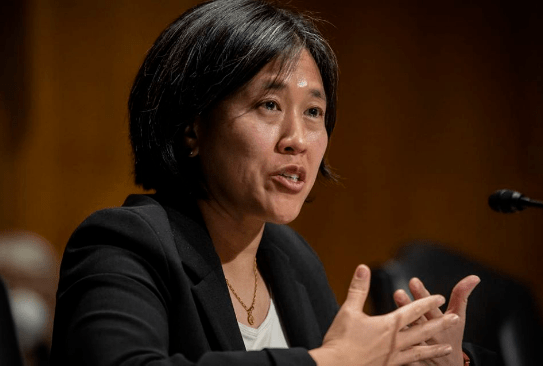Katherine Tai easily won Senate confirmation as U.S. Trade Representative, putting the former congressional staffer at the center of thorny decisions on enforcement and tariffs that President Joe Biden inherited from Donald Trump.
The Senate approved Tai, the first woman of color to serve in the job, in a 98-0 vote on Wednesday. She joins a team expected to build support with allies to confront China on issues from persecution of its Uighur minority in the western region of Xinjiang to trade practices that violate international commitments.
Tai received bipartisan support throughout the confirmation process, with Senate Minority Leader Mitch McConnell, a Kentucky Republican, on Wednesday prior to the vote calling her a “thoroughly qualified nominee” who will push back against China’s “abusive practices.”
At her confirmation hearing last month, Tai called on China to live up to the commitments in its trade pact with the U.S. — the strongest signal yet that the new administration plans to build on the accord brokered by its predecessor, rather than scrap it.
China “needs to deliver” on the promises it made in the January 2020 agreement, Tai said. She acknowledged that former officials have tried before to achieve structural changes in China’s economy and faced obstacles, saying the Biden administration needs to be “exploring all our options.”
Tai received plaudits from Democrats and Republicans alike. Her promise of a process- and consultation-driven approach is welcomed by lawmakers after four years of chaos under Trump, with tariff actions often coming as surprises announced via Twitter.
But so far she has offered few details on plans to hold China accountable. Biden has directed his administration to identify supply-chain vulnerabilities for key goods like semiconductors and rare earths — materials where the U.S. is heavily dependent on other countries, including adversaries like Beijing.
The U.S. and China fought a trade war under Trump that continues to see tariffs applied on about $335 billion of Chinese goods annually. In the so-called phase one agreement last year, China promised to purchase more American products. Beijing missed its 2020 trade-deal targets as the global pandemic upended shipping and supply chains.
China also pledged to combat the theft by Chinese companies of U.S. intellectual property and to do more to enforce IP rights in the country while also opening up its domestic market to U.S. financial-service providers.
The White House has said the trade deal, as well as other China-related actions taken by the previous administration, are under review until the Biden team decides on a path forward.
Tai will play a key role in setting and implementing Biden’s trade policy, which they both have promised to focus on workers and the middle class. The president’s policy is expected to focus more on enforcement actions than on negotiating new free-trade deals and expanding markets for exports, goals that were at the center of administrations prior to Trump. Tai also faces challenges like trying to resolve the long-running aircraft subsidy dispute between Boeing Co. and Airbus SE and helping reset the World Trade Organization.
Tai spent the past four years as the chief counsel for Democrats on the U.S. House Ways & Means Committee responsible for trade. She was a key figure in negotiations with the Trump administration and House Speaker Nancy Pelosi on a revamped North American Free Trade Agreement, which passed both the House and Senate with overwhelming bipartisan majorities and was signed by Trump last year.
Tai said that her top priority for the Nafta replacement deal, called the U.S.-Mexico-Canada Agreement, is to use the enforcement tools, particular those for labor that she negotiated.
Tai has also touted her experience as the chief counsel for China enforcement for three years at USTR, saying that she knows firsthand the importance of holding the nation accountable for its unfair trade practices, but also the dexterity required in U.S. policy.
